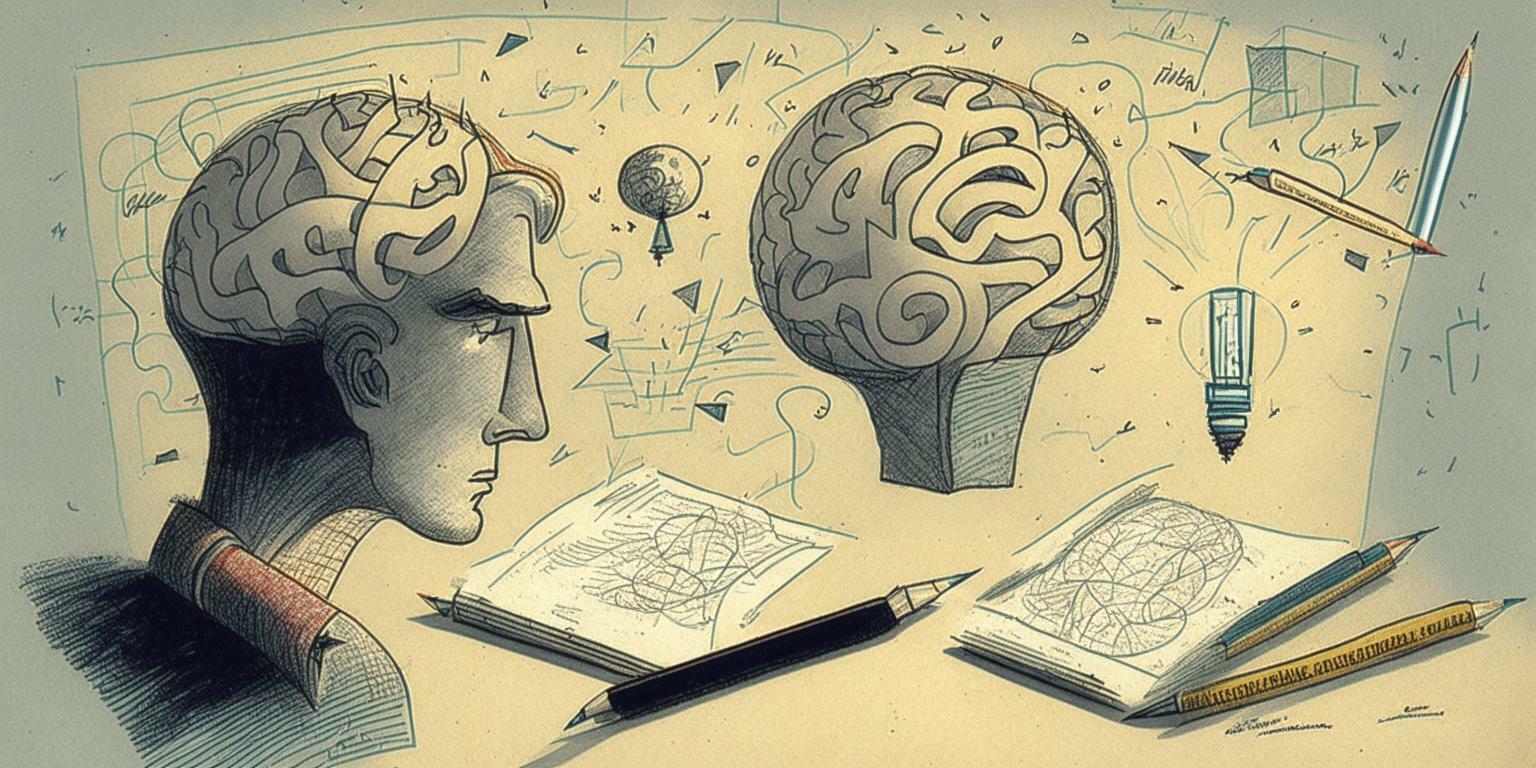What is rational or critical thinking, why it is needed, what problems it can solve in your life. How to learn to think rationally and communicate your thoughts to others.
Read the dialogues and think about what unites them
Example 1:
— I was at a party yesterday.
— How was it?
— Just a buzz! There were cool people there, everyone was so drunk and funny!
— Well, yes, that's right. Cool!
Example 2:
— You know, I bought myself a new phone yesterday!
— Wow, which one?
— Well, that's just super! There are a lot of functions, and the camera is better, and generally cool!
— Oh, cool! I also want a new phone for myself, I need to buy the same one.
Example 3:
— Have you seen that singer's new video?
— Yes, I looked.
— He's just a bomb! She has such a style, and the music is so cool, just super!
— Yes, it's true. She's cool!
Example 4:
— I think our team will win this match!
— I don't think so. Our players have not shown a good level of play for a long time.
— But we are fans and we have to believe in the team!
— Of course, I believe in our team, but I am realistic about its chances of winning.
— I was at a party yesterday.
— How was it?
— Just a buzz! There were cool people there, everyone was so drunk and funny!
— Well, yes, that's right. Cool!
Example 2:
— You know, I bought myself a new phone yesterday!
— Wow, which one?
— Well, that's just super! There are a lot of functions, and the camera is better, and generally cool!
— Oh, cool! I also want a new phone for myself, I need to buy the same one.
Example 3:
— Have you seen that singer's new video?
— Yes, I looked.
— He's just a bomb! She has such a style, and the music is so cool, just super!
— Yes, it's true. She's cool!
Example 4:
— I think our team will win this match!
— I don't think so. Our players have not shown a good level of play for a long time.
— But we are fans and we have to believe in the team!
— Of course, I believe in our team, but I am realistic about its chances of winning.
A few more examples, but with explanations
Example 5:
— I want to eat pie.
— The pie is fine, but I want pizza today.
— No, the pie is better. Let's eat a pie.
— But I say I want pizza, can't you accept my opinion? Don't you love me?
In this example, there is no rational thinking, since people cannot come to an agreement and respect someone else's opinion.
Rational thinking will help people discuss possible options and choose the most appropriate option that will satisfy both sides.
Example 6:
— I have so much to do today, I do not know where to start.
— Well, no one forces you to do them. Just forget it and rest today.
— But I have to finish everything before the end of the day.
— Yes, and what? They will never end anyway. Look at me, I never do anything and still live like a God.
This example also lacks rational thinking. Instead of helping a person to organize and do things, the second person tries to convince him not to do anything.
Rational thinking will help to look at the problem objectively and come to a reasonable solution.
Example 7:
— I'm lucky, I have a cat.
— Nonsense, cats are useless creatures.
— But my cat always comes to the rescue when I'm sad.
— You just give her goodies, so she loves you.
In this example, people cannot take into account the feelings and emotions of another person and cannot see the importance of communicating with pets.
Rational thinking would help everyone to respect other people's views on the world around them and try to understand what is important and valuable for each person.
Example 8:
— I found a dream job, but it is located in another city.
— Why do you need a new job? You work this way and that, and everything suits you.
— But this is a new challenge and an opportunity to start a new career.
— I don't know, I don't think you need to change anything in your life.
In this example, people do not take into account the prospects and opportunities for personal and professional growth.
Rational thinking helps a person to assess the risks and opportunities of a new job and make an informed decision.
Familiar situations? They're too familiar to me.
All these dialogues are united by the inability to listen to the interlocutor and the lack of rational thinking in one or all participants of the conversation.
Hence quarrels in the family, with friends, conflicts at work, and a complete misunderstanding of why this is happening. There is a feeling of lack of prospects. Disappointment in yourself, others and life as a result. Maybe depression.
So what should you do so that the dialogue becomes a dialogue and you can finally communicate with people so that they understand you?
— I want to eat pie.
— The pie is fine, but I want pizza today.
— No, the pie is better. Let's eat a pie.
— But I say I want pizza, can't you accept my opinion? Don't you love me?
In this example, there is no rational thinking, since people cannot come to an agreement and respect someone else's opinion.
Rational thinking will help people discuss possible options and choose the most appropriate option that will satisfy both sides.
Example 6:
— I have so much to do today, I do not know where to start.
— Well, no one forces you to do them. Just forget it and rest today.
— But I have to finish everything before the end of the day.
— Yes, and what? They will never end anyway. Look at me, I never do anything and still live like a God.
This example also lacks rational thinking. Instead of helping a person to organize and do things, the second person tries to convince him not to do anything.
Rational thinking will help to look at the problem objectively and come to a reasonable solution.
Example 7:
— I'm lucky, I have a cat.
— Nonsense, cats are useless creatures.
— But my cat always comes to the rescue when I'm sad.
— You just give her goodies, so she loves you.
In this example, people cannot take into account the feelings and emotions of another person and cannot see the importance of communicating with pets.
Rational thinking would help everyone to respect other people's views on the world around them and try to understand what is important and valuable for each person.
Example 8:
— I found a dream job, but it is located in another city.
— Why do you need a new job? You work this way and that, and everything suits you.
— But this is a new challenge and an opportunity to start a new career.
— I don't know, I don't think you need to change anything in your life.
In this example, people do not take into account the prospects and opportunities for personal and professional growth.
Rational thinking helps a person to assess the risks and opportunities of a new job and make an informed decision.
Familiar situations? They're too familiar to me.
All these dialogues are united by the inability to listen to the interlocutor and the lack of rational thinking in one or all participants of the conversation.
Hence quarrels in the family, with friends, conflicts at work, and a complete misunderstanding of why this is happening. There is a feeling of lack of prospects. Disappointment in yourself, others and life as a result. Maybe depression.
So what should you do so that the dialogue becomes a dialogue and you can finally communicate with people so that they understand you?

How know have rational thinking or not?
Rational thinking is the ability to analyze information, question assumptions and conclusions, rely on evidence and logic.
If you want to understand whether you have rational (critical) thinking or not, here are some signs that you should pay attention to:
1. You often ask questions when something is unclear and do not take information for granted without verification.
2. You are able to analyze information sources to determine their reliability and reliability.
3. You are able to show tolerance and openness to the ideas and opinions of others, but not to accept them thoughtlessly.
4. You can put yourself in the place of other people and consider the issue from different points of view.
5. You have the ability for rational thinking and logical analysis.
If you have these signs, then you probably have critical thinking. However, it is important to note that rational thinking is a process that can be developed, and there is always an opportunity to become more critical and logical in your thoughts and decisions.
If you want to understand whether you have rational (critical) thinking or not, here are some signs that you should pay attention to:
1. You often ask questions when something is unclear and do not take information for granted without verification.
2. You are able to analyze information sources to determine their reliability and reliability.
3. You are able to show tolerance and openness to the ideas and opinions of others, but not to accept them thoughtlessly.
4. You can put yourself in the place of other people and consider the issue from different points of view.
5. You have the ability for rational thinking and logical analysis.
If you have these signs, then you probably have critical thinking. However, it is important to note that rational thinking is a process that can be developed, and there is always an opportunity to become more critical and logical in your thoughts and decisions.
What indirect signs can show that I definitely do not have rational thinking?
Rational thinking is the ability to analyze and evaluate information critically, in detail and objectively.
If you have the following symptoms, it may be an indirect sign of a lack of critical thinking:
1. You often make decisions based on emotions, not logic.
2. You do not pay attention to facts that contradict your beliefs and preferences.
3. You often criticize others, having only one point of view, without trying to find out all sides of the arguments.
4. You don't care about listening to and understanding other people's point of view.
5. You do not know how to formulate your point of view and argue your theses.
6. You are not interested in additional data that can help you make a decision.
If you notice that you have any of these signs, you may have a lack of critical thinking. However, this does not mean that you cannot develop these skills. There are many tools and techniques available to help you become a more critical thinker.
If you have the following symptoms, it may be an indirect sign of a lack of critical thinking:
1. You often make decisions based on emotions, not logic.
2. You do not pay attention to facts that contradict your beliefs and preferences.
3. You often criticize others, having only one point of view, without trying to find out all sides of the arguments.
4. You don't care about listening to and understanding other people's point of view.
5. You do not know how to formulate your point of view and argue your theses.
6. You are not interested in additional data that can help you make a decision.
If you notice that you have any of these signs, you may have a lack of critical thinking. However, this does not mean that you cannot develop these skills. There are many tools and techniques available to help you become a more critical thinker.

The study of rational thinking can help in a number of different areas, including:
Decision making
Critical thinking allows you to consider all aspects of the situation and make more balanced and informed decisions;
Developing leadership skills
Critical-minded people are able to lead other people better because they can better analyze information and make informed decisions;
Improving intellectual abilities
Critical thinking requires efforts from the mind and the hardening of internal discipline, which leads to an improvement in intellectual abilities and reasoning abilities.
Critical thinking allows you to consider all aspects of the situation and make more balanced and informed decisions;
Developing leadership skills
Critical-minded people are able to lead other people better because they can better analyze information and make informed decisions;
Improving intellectual abilities
Critical thinking requires efforts from the mind and the hardening of internal discipline, which leads to an improvement in intellectual abilities and reasoning abilities.
In order to become a critically thinking person, you can use the following methods:
— Ask yourself questions and try to find answers to them;
— Actively listen and analyze information received from different sources;
— Read information from all sides, try to understand the context and the source of information;
— Pay attention to the evidence and compare different points of view;
— Question the information that is provided to you and look for evidence.
In general, to become better at rational thinking, it is necessary to improve your skills and develop mental discipline. This can be achieved by practice and extreme development in their abilities.
— Actively listen and analyze information received from different sources;
— Read information from all sides, try to understand the context and the source of information;
— Pay attention to the evidence and compare different points of view;
— Question the information that is provided to you and look for evidence.
In general, to become better at rational thinking, it is necessary to improve your skills and develop mental discipline. This can be achieved by practice and extreme development in their abilities.

How can a person with rational thinking communicate effectively with people without rational thinking so that he is understood and heard?
Despite the fact that not all people have the same approach to thinking, there are some ways that can help to communicate effectively with people without rational thinking.
1. Use simple language
People with rational thinking often use a variety of images, slang and expressions to express their thoughts. Try to express your thoughts in simple language, use short phrases and everyday words so that your interlocutor can understand you better.
2. Adapt your communication style
We are all different, and each of us perceives and perceives information differently. To communicate effectively with people, it is necessary to adapt your communication style to their individual needs. If you are communicating with someone who understands information better when it is visualized, use pictures and diagrams to explain. If your interlocutor quickly gets confused in the details, try to break the information into smaller, easily digestible pieces.
3. Show respect for each other's culture
One of the key aspects of effective communication is to show respect for each other's culture and traditions. If you are communicating with someone from another culture, try to understand their traditions, values and respect their point of view, even if you cannot agree with it.
4. Listen carefully and ask questions
Effective communication is a dialogue, not a monologue. You should not only talk, but also listen, understand and ask questions. Pay special attention to what your interlocutor says and be interested in his opinion.
5. Use emotional intelligence
Emotional intelligence allows us to better understand and manage our own emotions, as well as the emotions of other people. If you can show your emotional openness and understanding, it will help to reduce the tension in communication and increase the effectiveness of your communication.
If you want to better understand how critical thinking works, read the book “Harry Potter and methods of rational thinking.”. This is an exciting alternative story about the magical world of Britain and Harry Potter, whose adoptive father was a scientist and loved his son.
And a few stories on this topic.
1. Use simple language
People with rational thinking often use a variety of images, slang and expressions to express their thoughts. Try to express your thoughts in simple language, use short phrases and everyday words so that your interlocutor can understand you better.
2. Adapt your communication style
We are all different, and each of us perceives and perceives information differently. To communicate effectively with people, it is necessary to adapt your communication style to their individual needs. If you are communicating with someone who understands information better when it is visualized, use pictures and diagrams to explain. If your interlocutor quickly gets confused in the details, try to break the information into smaller, easily digestible pieces.
3. Show respect for each other's culture
One of the key aspects of effective communication is to show respect for each other's culture and traditions. If you are communicating with someone from another culture, try to understand their traditions, values and respect their point of view, even if you cannot agree with it.
4. Listen carefully and ask questions
Effective communication is a dialogue, not a monologue. You should not only talk, but also listen, understand and ask questions. Pay special attention to what your interlocutor says and be interested in his opinion.
5. Use emotional intelligence
Emotional intelligence allows us to better understand and manage our own emotions, as well as the emotions of other people. If you can show your emotional openness and understanding, it will help to reduce the tension in communication and increase the effectiveness of your communication.
If you want to better understand how critical thinking works, read the book “Harry Potter and methods of rational thinking.”. This is an exciting alternative story about the magical world of Britain and Harry Potter, whose adoptive father was a scientist and loved his son.
And a few stories on this topic.

A story about a student and rational thinking
One day a student came to a lecture on philosophy and behavior. The teacher started talking about critical thinking and asked the students what it was. Carl was sure he knew the answer and was ready to share it with the class.
"Critical thinking is the ability to analyze information, think about it, and make informed decisions based on facts and arguments." Karl said.
The teacher smiled and came closer to Karl. "I like your answer, Carl." — he said. "But tell me, how can you be sure that this is the right answer?"
Carl thought about it. It seemed to him that his answer was obvious, and he did not think about what might be wrong. But under the influence of the teacher's question, he began to ask himself questions.
"Well, I think it's right because... well... it has always been so accepted" — he replied, not too confidently.
"But what if it's not?" — the teacher asked. "What if there are still other approaches to critical thinking that we are not considering?"
Carl began to realize that critical thinking is not as easy as it seemed to him. He began to understand that you can't just take information on faith, but you need to analyze it, check it for authenticity and think about different options.
Eventually, under the influence of the teacher and his own thoughts, Karl began to perceive information with more criticism, analyze it and look for additional information in order to make informed decisions.
This story shows that critical thinking is not just the ability to give the right answer, but it is a complex process that requires careful analysis, doubt and consideration of objective facts and arguments. But if you learn to think critically, you will be able to make more informed decisions and achieve greater success in life.
Critical thinking will help you at any age and situation.
"Critical thinking is the ability to analyze information, think about it, and make informed decisions based on facts and arguments." Karl said.
The teacher smiled and came closer to Karl. "I like your answer, Carl." — he said. "But tell me, how can you be sure that this is the right answer?"
Carl thought about it. It seemed to him that his answer was obvious, and he did not think about what might be wrong. But under the influence of the teacher's question, he began to ask himself questions.
"Well, I think it's right because... well... it has always been so accepted" — he replied, not too confidently.
"But what if it's not?" — the teacher asked. "What if there are still other approaches to critical thinking that we are not considering?"
Carl began to realize that critical thinking is not as easy as it seemed to him. He began to understand that you can't just take information on faith, but you need to analyze it, check it for authenticity and think about different options.
Eventually, under the influence of the teacher and his own thoughts, Karl began to perceive information with more criticism, analyze it and look for additional information in order to make informed decisions.
This story shows that critical thinking is not just the ability to give the right answer, but it is a complex process that requires careful analysis, doubt and consideration of objective facts and arguments. But if you learn to think critically, you will be able to make more informed decisions and achieve greater success in life.
Critical thinking will help you at any age and situation.

A story about a teenager and rational thinking
Michael was a teenager who lived without critical thinking. He loved spending time with friends, playing sports, listening to music and playing video games. His academic progress was modest, but he didn't really care. He was sure that everything would be fine with him, and life would turn out the way it should.
However, one day Michael faced a serious problem. His best friend Josh started using drugs. Michael didn't understand how to help his friend and why he started behaving so strangely. Michael was confused and felt helpless.
Michael started looking for ways to get Josh out of addiction. He Googled, asked for advice from friends and acquaintances, but all attempts were unsuccessful. Then Michael wondered if it could be that he does not know how to think critically? And what if the problem lies not in Josh, but in his own lack of critical thinking?
Michael decided to start studying critical thinking. He read a lot of books, attended lectures and seminars, and trained much more than ever. He learned that critical thinking is the ability to analyze information, realize your mistakes and make informed decisions.
Gradually, Michael began to realize how much he had missed in his life, not being able to think critically. He began to see the mistakes his friends were making and learned to respond to them. Eventually, Michael found a way to help Josh get rid of addiction, and he felt ready to help other people.
Today, Michael continues to live a full life, but since he began to think critically, his life has changed for the better. He has become more confident and wealthy, and most importantly, he is no longer afraid to make the necessary decisions. After all, he knows how important it is to have a critical mind in order not only to achieve life goals, but also to help other people in the process.
Or..
However, one day Michael faced a serious problem. His best friend Josh started using drugs. Michael didn't understand how to help his friend and why he started behaving so strangely. Michael was confused and felt helpless.
Michael started looking for ways to get Josh out of addiction. He Googled, asked for advice from friends and acquaintances, but all attempts were unsuccessful. Then Michael wondered if it could be that he does not know how to think critically? And what if the problem lies not in Josh, but in his own lack of critical thinking?
Michael decided to start studying critical thinking. He read a lot of books, attended lectures and seminars, and trained much more than ever. He learned that critical thinking is the ability to analyze information, realize your mistakes and make informed decisions.
Gradually, Michael began to realize how much he had missed in his life, not being able to think critically. He began to see the mistakes his friends were making and learned to respond to them. Eventually, Michael found a way to help Josh get rid of addiction, and he felt ready to help other people.
Today, Michael continues to live a full life, but since he began to think critically, his life has changed for the better. He has become more confident and wealthy, and most importantly, he is no longer afraid to make the necessary decisions. After all, he knows how important it is to have a critical mind in order not only to achieve life goals, but also to help other people in the process.
Or..

A story about an old man and rational thinking
Mr. Brown was an old man in his 70s. He lived a completely carefree life, not thinking about what was happening in the world around him. He believed everything that was said on TV and believed in every word of his acquaintances. Mr. Brown was very trusting and did not know how to think critically.
He did not notice how his son quite often came to him for money under various pretexts. Each time, Mr. Brown unconditionally gave his son the requested amount, without thinking about what it could be spent on.
Everything changed after Mr. Brown was admitted to the hospital. His son disappeared and did not visit his father in the hospital. Lonely Mr. Brown began to think about what had happened to his life and realized that all the years he had lived without critical thinking. He understood that his credulity had been abused, and that he had been deceived by many people.
He started reading newspapers and listening to the news to keep up with the events and started asking questions. He learned to think critically. He began to understand that people not only can lie, but also constantly do it and that it is necessary to check every statement.
Mr. Brown completely revised his life and the changes were not long in coming. He found new friends who valued him for his communication and personality, not his money. He became more independent in his decisions. He stopped being a victim and gained his independence.
Mr. Brown understood that he could not change his past, but he accepted it and realized that in the future he would look at life critically and wisely. He used his experience to find more reasonable and deliberate decisions in his life. And became happier.
He did not notice how his son quite often came to him for money under various pretexts. Each time, Mr. Brown unconditionally gave his son the requested amount, without thinking about what it could be spent on.
Everything changed after Mr. Brown was admitted to the hospital. His son disappeared and did not visit his father in the hospital. Lonely Mr. Brown began to think about what had happened to his life and realized that all the years he had lived without critical thinking. He understood that his credulity had been abused, and that he had been deceived by many people.
He started reading newspapers and listening to the news to keep up with the events and started asking questions. He learned to think critically. He began to understand that people not only can lie, but also constantly do it and that it is necessary to check every statement.
Mr. Brown completely revised his life and the changes were not long in coming. He found new friends who valued him for his communication and personality, not his money. He became more independent in his decisions. He stopped being a victim and gained his independence.
Mr. Brown understood that he could not change his past, but he accepted it and realized that in the future he would look at life critically and wisely. He used his experience to find more reasonable and deliberate decisions in his life. And became happier.



